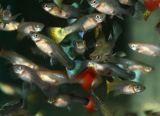seminar – Tuesday 25th November 2014
 Social environment and male mate choice in a promiscuous fission-fusion fish society
Social environment and male mate choice in a promiscuous fission-fusion fish society
Jean-Guy J. Godin, Carleton University, Ottawa, Canada
Tuesday 25th November 2014, 11AM, amphitheatre Monge
Group living and social behaviour in animals are ubiquitous in nature. Social behaviour (including mating behaviour) is particularly special because conspecifics are selective agents, which can lead to interesting evolutionary dynamics. An individual’s social environment can therefore importantly influence its behaviour and fitness, with implications for social evolution and sexual selection. In this seminar, I will summarize some of our recent research on how males modify their mating tactics in response to variation in the risk of sperm competition, how they use of social information in making mate-choice decisions, and how they can select their social environment so as to enhance their sexual attractiveness and maximize sexual competitiveness. We use the Trinidadian guppy (Poecilia reticulata) as a model study system; this species lives in fission-fusion societies in nature and exhibits mutual mate choice and a promiscuous mating system with high levels of multiple mating and sperm competition.
- kc_data:
- a:8:{i:0;s:0:"";s:4:"mode";s:0:"";s:3:"css";s:0:"";s:9:"max_width";s:0:"";s:7:"classes";s:0:"";s:9:"thumbnail";s:0:"";s:9:"collapsed";s:0:"";s:9:"optimized";s:0:"";}
- kc_raw_content:
 Social environment and male mate choice in a promiscuous fission-fusion fish society
Social environment and male mate choice in a promiscuous fission-fusion fish societyJean-Guy J. Godin, Carleton University, Ottawa, Canada
Tuesday 25th November 2014, 11AM, amphitheatre Monge
Group living and social behaviour in animals are ubiquitous in nature. Social behaviour (including mating behaviour) is particularly special because conspecifics are selective agents, which can lead to interesting evolutionary dynamics. An individual’s social environment can therefore importantly influence its behaviour and fitness, with implications for social evolution and sexual selection. In this seminar, I will summarize some of our recent research on how males modify their mating tactics in response to variation in the risk of sperm competition, how they use of social information in making mate-choice decisions, and how they can select their social environment so as to enhance their sexual attractiveness and maximize sexual competitiveness. We use the Trinidadian guppy (Poecilia reticulata) as a model study system; this species lives in fission-fusion societies in nature and exhibits mutual mate choice and a promiscuous mating system with high levels of multiple mating and sperm competition.
